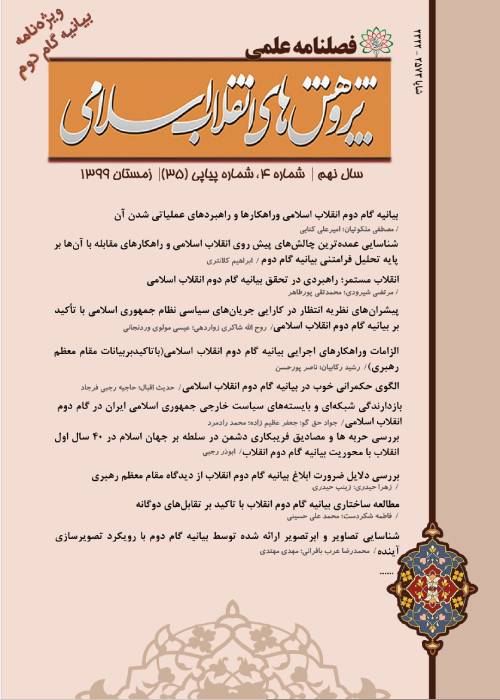Investigating on the Functioning of Specialized Governance Institutions in Combating Economic Corruption from the Perspective of Islamic Revolution Philosophy
Author(s):
Article Type:
Research/Original Article (دارای رتبه معتبر)
Abstract:
The burden of high political, economic and social costs of corruption over the last few decades has made the fight against corruption a priority for many countries. Economic disadvantages are the major obstacles to the establishment of the political and governmental system of Islam and repeated difficulties and sufferings that, whenever it appears, threaten the realization of "justice" and also it is considered the pest and danger in the path to growth in all aspects of political management and the legal system of the Islamic system. In examining the reasons and philosophy of the Islamic Revolution, the ideas of Imam Khomaini and the Supreme Leader have been considered as one of the most important principles in the fight against economic corruption. The importance of combating economic corruption is so great that the Supreme Leader in the year 2002 issued a decree of eight articles in the fight against economic corruption, and even on the basis of that, headquarters for fight against economic corruption was formed. The present study uses a descriptive-analytical method to investigate the role of specialized governing institutions in combating economic corruption in terms of the philosophy of the Islamic Revolution. The findings of this research show that the most important causes of economic corruption in the country are included: the diversity of specialized institutions of struggle against corruptions, rentier and petroleum economics, the lack of effective political will in some state institutions, the lack of participation of specialized civil societies in the fight against corruption, the weakness of the rule of law and obscure regulation, government interference in the economy and the large government, lack of scientific dealing with corruption, lack of financial transparency in the electoral system and, most importantly, the lack of strict implementation of the eight articles of the Supreme Leader on combating corruption so it is necessary to reform the norms (laws), structures (establishment of the anticorruption organization) and organizational behaviors, the efficiency and effectiveness of the governing bodies, by transforming the establishment of the National Transparency Institute or the institution of combating economic corruption into economic and financial transparency with correction of the institutional structures of the anti-corruption sovereignty.
Language:
Persian
Published:
Journal of Islamic Revolution Research, Volume:6 Issue: 22, 2017
Pages:
233 to 266
magiran.com/p1839006
دانلود و مطالعه متن این مقاله با یکی از روشهای زیر امکان پذیر است:
اشتراک شخصی
با عضویت و پرداخت آنلاین حق اشتراک یکساله به مبلغ 1,390,000ريال میتوانید 70 عنوان مطلب دانلود کنید!
اشتراک سازمانی
به کتابخانه دانشگاه یا محل کار خود پیشنهاد کنید تا اشتراک سازمانی این پایگاه را برای دسترسی نامحدود همه کاربران به متن مطالب تهیه نمایند!
توجه!
- حق عضویت دریافتی صرف حمایت از نشریات عضو و نگهداری، تکمیل و توسعه مگیران میشود.
- پرداخت حق اشتراک و دانلود مقالات اجازه بازنشر آن در سایر رسانههای چاپی و دیجیتال را به کاربر نمیدهد.
دسترسی سراسری کاربران دانشگاه پیام نور!
اعضای هیئت علمی و دانشجویان دانشگاه پیام نور در سراسر کشور، در صورت ثبت نام با ایمیل دانشگاهی، تا پایان فروردین ماه 1403 به مقالات سایت دسترسی خواهند داشت!
In order to view content subscription is required
Personal subscription
Subscribe magiran.com for 70 € euros via PayPal and download 70 articles during a year.
Organization subscription
Please contact us to subscribe your university or library for unlimited access!


